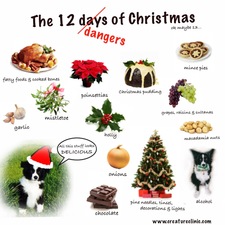Counter Surfers
Do counter surfers live in your home? We have learned that we are owned by one dog and two goats. Or at least Trooper and Luke act like goats sometimes. Back when Beau was still living he won the prize for counter surfers. Beau routinely counter surfed and managed to snag sandwiches, rotisserie chicken, bread and freshly baked blueberry muffins!
Trooper, our English Springer Spaniel “Goat” prefers toilet tissue, Kleenex and paper towels. His favorite game of all time is to steal a washcloth, hand towel or sock and run to his crate where he waits on a treat to entice him to drop the stolen bounty.
We would love to hear from you what your dog chooses to take for ransom. Post your answers on our Facebook page please.
But in all seriousness we do want to offer a reminder about year round and holiday dangers to your cats, dogs, birds and guinea pigs.

Pet Poison Helpline (855) 886-7965 offers this information about routine pet poisons.
Based on our Pet Poison Helpline call volume and extensive database, here are the top 10 most common toxins that Pet Poison Helpline gets called about. Now keep in mind that some of these listed are very toxic, while some are minimally toxic (like ant baits and silica packs). When in doubt, call your vet or Pet Poison Helpline to make sure there won’t be a problem. Take special care to keep these toxins out of your pet’s reach and pet-proof your house!
Dog Poisons
- Chocolate
- Mouse and Rat Poisons (rodenticides)
- Vitamins and Minerals (e.g., Vitamin D3, iron, etc.)
- NSA
- IDs (e.g., ibuprofen, naproxen, etc.)
- Cardiac Medications (e.g., calcium channel blockers, beta-blockers, etc.)
- Cold and Allergy Medications (e.g., pseudoephedrine, phenylephrine, etc.)
- Antidepressants (e.g., selective serotonin reuptake inhibitors)
- Xylitol
- Acetaminophen (e.g., Tylenol)
- Caffeine Pills
Cat Poisons
- Topical spot-on insecticides
- Household Cleaners
- Antidepressants
- Lilies
- Insoluble Oxalate Plants (e.g., Dieffenbachia, Philodendron, etc.)
- Human and Veterinary NSAIDs
- Cold and Flu Medication (e.g., Tylenol)
- Glow Sticks
- ADD/ADHD Medications/Amphetamines
- Mouse and Rat Poison
If you suspect your pet has ingested any of these items or any other questionable substance, call Pet Poison Helpline or your veterinarian for assistance. Accurate and timely identification of the suspected substance is very important. Having the container, package, or label in hand will save valuable time and may save the life of your pet.
Here’s a common language interpretation on the names above
NSAIDs (e.g. Advil, Aleve and Motrin)
Acetaminophen (e.g. Tylenol)
Antidepressants (e.g. Effexor, Cymbalta, Prozac, Lexapro)
ADD/ADHD medications (e.g. Concerta, Adderall, Ritalin)
Benzodiazepines and sleep aids (e.g. Xanax, Klonopin, Ambien, Lunesta)
Birth control (e.g. estrogen, estradiol, progesterone)
ACE Inhibitors (e.g. Zestril, Altace)
Beta-blockers (e.g. Tenormin, Toprol, Coreg)
Thyroid hormones (e.g. Armour desiccated thyroid, Synthroid)
Cholesterol lowering agents (e.g. Lipitor, Zocor, Crestor)
The veterinarians at Pet Poison Helpline recommend keeping these fall items away from all pets
- mushrooms
- mothballs
- antifreeze
- mouse and rat poisons
- compost bins or piles
- Maple tree leaves
They recommend keeping these seasonal holiday items away from all pets
- tinsel
- lilies, holly, mistletoe and poinsettia
- alcohol
- grapes, raisins and currants
- chocolate
- Xylitol (artificial sweetener often found in sugarless gum and candy)
- leftover fatty meat scraps (can lead to pancreatitis)
- imported snow globes
- liquid potpourri
Other Items to Protect From Counter Surfers
We also recommend you keep wrapping paper, ribbon and the Christmas tree water out of reach of your cats and dogs. You may want to consider installing a gate or closing the door to the room with the tree. When you are doing your holiday baking remember that if pets ingest uncooked dough it will “rise” in their bellies and can cause an obstruction. Those other Christmas decorations are also items that can break or splinter or create an obstruction that requires surgery.
A few other food items to avoid allowing your cats and dogs to eat include caffeine found in coffee or tea, under cooked or raw turkey, cake batter, sage (often included in stuffing), candy and candy wrappers, wrappings (foil, waxed paper, plastic wrap, plastic silverware, toothpicks, skewers, etc).
The ASPCA provides a list of plants that are toxic to cats, dogs and horses.
Here’s wishing you a Thankful Thanksgiving, Joyous Christmas and Happy New Year all in SAFETY!!













Recent Comments